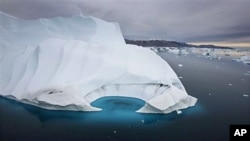When ministers of the eight-nation Arctic Council meet in Greenland May 12 to discuss a variety of issues crucial to the polar region they will have the benefit of two reports commissioned by the Council on the changing climate and how to best respond to accelerating warming.
The first report produced by the Council’s scientific arm updates the assessment made by the United Nations Panel on Climate Change in 2007. Leading American glaciologist Gordon Hamilton at the University of Maine says arctic conditions have changed dramatically since then. “With our new understanding on how ice sheets are behaving and how they are responding to climate change, we can say that the IPCC estimate for sea level rise from 18-59 centimeters is a very large underestimate and we are looking at something probably at least twice as large as the upper end of the estimate. So we are expecting one meter of sea level rise by 2100.”
That poses a threat to low lying coastal communities, where half the world population lives. The report also finds that the Arctic Ocean could become nearly ice-free in the summers within the next 30 to 40 years. And, Hamilton says, researchers do not expect the oceans to cool down for a long time. “If it is that the ice sheets [are] responding to the ocean [temperature], that change is going to persist for decades to come. There’s not an easy way to switch that off.”
But a second report authored by an Arctic Council task force finds that the ice melt can be slowed down dramatically within the next few decades by curbing air pollution. U.S. government chemist Patricia Quinn contributed to that report. She says, while CO2 reductions are central in any effort to mitigate climate change, attention must be paid to shorter lived pollutants like the soot from truck and ships, known as black carbon, and methane from oil and gas drilling, coal mines and waste systems. “Immediate reductions in short-lived climate forcers [climate changing emissions] including black carbon, methane and ozone will have a larger near term impact on global temperature than immediate reductions in CO2. So by 2040 we could have a much larger impact on decreasing warming by focusing on the short-term climate forcers.”
Armond Cohen is Executive Director of the Clean Air Task Force, an independent advocacy and research group. His group is calling on the Arctic Council to take specific actions based on the report’s broad recommendations. “The first thing they could do as a group is advocate to the International Maritime Organization, which regulates shipping emissions for requiring ships operating in the Northern Hemisphere to be zero emissions. The second thing that they could do as a group would be to adopt a policy that any future oil and gas exploration or shipping in the Arctic needs to occur with zero emissions of black carbon and methane.”
The Clean Air Task Force also encourages each Arctic member state - the U.S, Russia, Canada, Sweden, Finland, Denmark, Norway and Iceland - to take aggressive steps to get dirty diesel trucks off the roads or retrofit their engines. Cohen wants to see Northern European countries regulate emissions on high admitting heating stoves, and Moscow reduce the risk of widespread forest fires that emerge from agriculture burning. “This is something that can be done at relatively low cost with very much available control technology. I think when the ministers recognize that that is the case, we’ll hopefully see after this meeting, a move to much more action, which is where it’s really going to count.”
That message is one U.S. Deputy Secretary of State James Steinberg says the U.S. Delegation will address in Greenland. “At the Arctic meeting in Nuuk, Greenland (we will) urge Arctic Nations to take mitigation actions domestically so that we can slow down Arctic melting while we deal with the broader debate on global climate change.”
According to the United Nations, these measures could suppress up to two-thirds of the warming currently expected in the Arctic over the next several decades.




